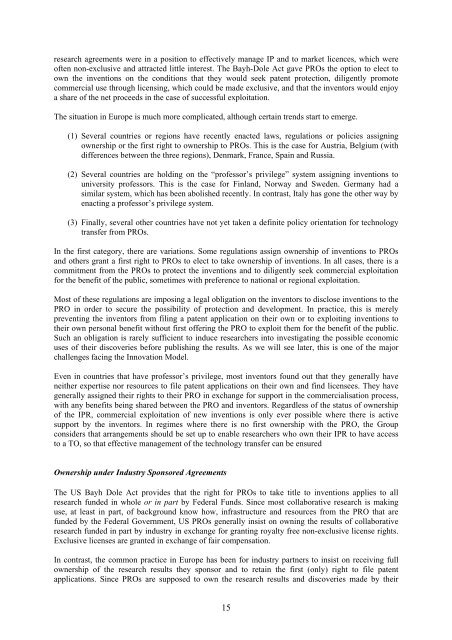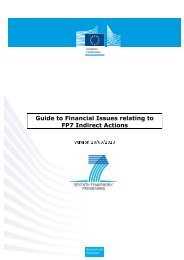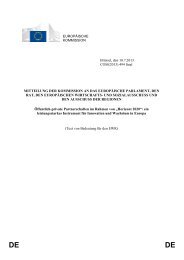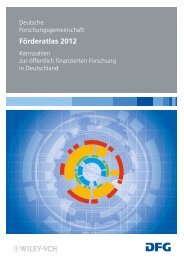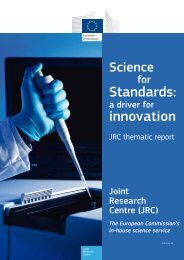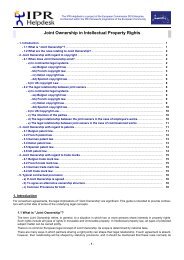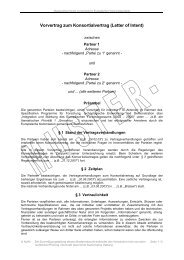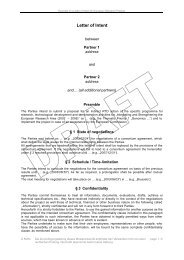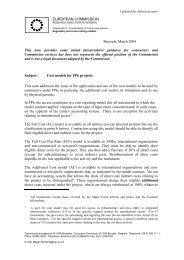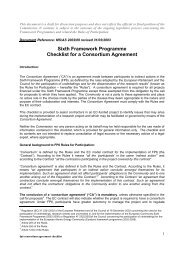Expert Group Report Management of Intellectual Property in ... - KoWi
Expert Group Report Management of Intellectual Property in ... - KoWi
Expert Group Report Management of Intellectual Property in ... - KoWi
Create successful ePaper yourself
Turn your PDF publications into a flip-book with our unique Google optimized e-Paper software.
esearch agreements were <strong>in</strong> a position to effectively manage IP and to market licences, which were<br />
<strong>of</strong>ten non-exclusive and attracted little <strong>in</strong>terest. The Bayh-Dole Act gave PROs the option to elect to<br />
own the <strong>in</strong>ventions on the conditions that they would seek patent protection, diligently promote<br />
commercial use through licens<strong>in</strong>g, which could be made exclusive, and that the <strong>in</strong>ventors would enjoy<br />
a share <strong>of</strong> the net proceeds <strong>in</strong> the case <strong>of</strong> successful exploitation.<br />
The situation <strong>in</strong> Europe is much more complicated, although certa<strong>in</strong> trends start to emerge.<br />
(1) Several countries or regions have recently enacted laws, regulations or policies assign<strong>in</strong>g<br />
ownership or the first right to ownership to PROs. This is the case for Austria, Belgium (with<br />
differences between the three regions), Denmark, France, Spa<strong>in</strong> and Russia.<br />
(2) Several countries are hold<strong>in</strong>g on the “pr<strong>of</strong>essor’s privilege” system assign<strong>in</strong>g <strong>in</strong>ventions to<br />
university pr<strong>of</strong>essors. This is the case for F<strong>in</strong>land, Norway and Sweden. Germany had a<br />
similar system, which has been abolished recently. In contrast, Italy has gone the other way by<br />
enact<strong>in</strong>g a pr<strong>of</strong>essor’s privilege system.<br />
(3) F<strong>in</strong>ally, several other countries have not yet taken a def<strong>in</strong>ite policy orientation for technology<br />
transfer from PROs.<br />
In the first category, there are variations. Some regulations assign ownership <strong>of</strong> <strong>in</strong>ventions to PROs<br />
and others grant a first right to PROs to elect to take ownership <strong>of</strong> <strong>in</strong>ventions. In all cases, there is a<br />
commitment from the PROs to protect the <strong>in</strong>ventions and to diligently seek commercial exploitation<br />
for the benefit <strong>of</strong> the public, sometimes with preference to national or regional exploitation.<br />
Most <strong>of</strong> these regulations are impos<strong>in</strong>g a legal obligation on the <strong>in</strong>ventors to disclose <strong>in</strong>ventions to the<br />
PRO <strong>in</strong> order to secure the possibility <strong>of</strong> protection and development. In practice, this is merely<br />
prevent<strong>in</strong>g the <strong>in</strong>ventors from fil<strong>in</strong>g a patent application on their own or to exploit<strong>in</strong>g <strong>in</strong>ventions to<br />
their own personal benefit without first <strong>of</strong>fer<strong>in</strong>g the PRO to exploit them for the benefit <strong>of</strong> the public.<br />
Such an obligation is rarely sufficient to <strong>in</strong>duce researchers <strong>in</strong>to <strong>in</strong>vestigat<strong>in</strong>g the possible economic<br />
uses <strong>of</strong> their discoveries before publish<strong>in</strong>g the results. As we will see later, this is one <strong>of</strong> the major<br />
challenges fac<strong>in</strong>g the Innovation Model.<br />
Even <strong>in</strong> countries that have pr<strong>of</strong>essor’s privilege, most <strong>in</strong>ventors found out that they generally have<br />
neither expertise nor resources to file patent applications on their own and f<strong>in</strong>d licensees. They have<br />
generally assigned their rights to their PRO <strong>in</strong> exchange for support <strong>in</strong> the commercialisation process,<br />
with any benefits be<strong>in</strong>g shared between the PRO and <strong>in</strong>ventors. Regardless <strong>of</strong> the status <strong>of</strong> ownership<br />
<strong>of</strong> the IPR, commercial exploitation <strong>of</strong> new <strong>in</strong>ventions is only ever possible where there is active<br />
support by the <strong>in</strong>ventors. In regimes where there is no first ownership with the PRO, the <strong>Group</strong><br />
considers that arrangements should be set up to enable researchers who own their IPR to have access<br />
to a TO, so that effective management <strong>of</strong> the technology transfer can be ensured<br />
Ownership under Industry Sponsored Agreements<br />
The US Bayh Dole Act provides that the right for PROs to take title to <strong>in</strong>ventions applies to all<br />
research funded <strong>in</strong> whole or <strong>in</strong> part by Federal Funds. S<strong>in</strong>ce most collaborative research is mak<strong>in</strong>g<br />
use, at least <strong>in</strong> part, <strong>of</strong> background know how, <strong>in</strong>frastructure and resources from the PRO that are<br />
funded by the Federal Government, US PROs generally <strong>in</strong>sist on own<strong>in</strong>g the results <strong>of</strong> collaborative<br />
research funded <strong>in</strong> part by <strong>in</strong>dustry <strong>in</strong> exchange for grant<strong>in</strong>g royalty free non-exclusive license rights.<br />
Exclusive licenses are granted <strong>in</strong> exchange <strong>of</strong> fair compensation.<br />
In contrast, the common practice <strong>in</strong> Europe has been for <strong>in</strong>dustry partners to <strong>in</strong>sist on receiv<strong>in</strong>g full<br />
ownership <strong>of</strong> the research results they sponsor and to reta<strong>in</strong> the first (only) right to file patent<br />
applications. S<strong>in</strong>ce PROs are supposed to own the research results and discoveries made by their<br />
15


